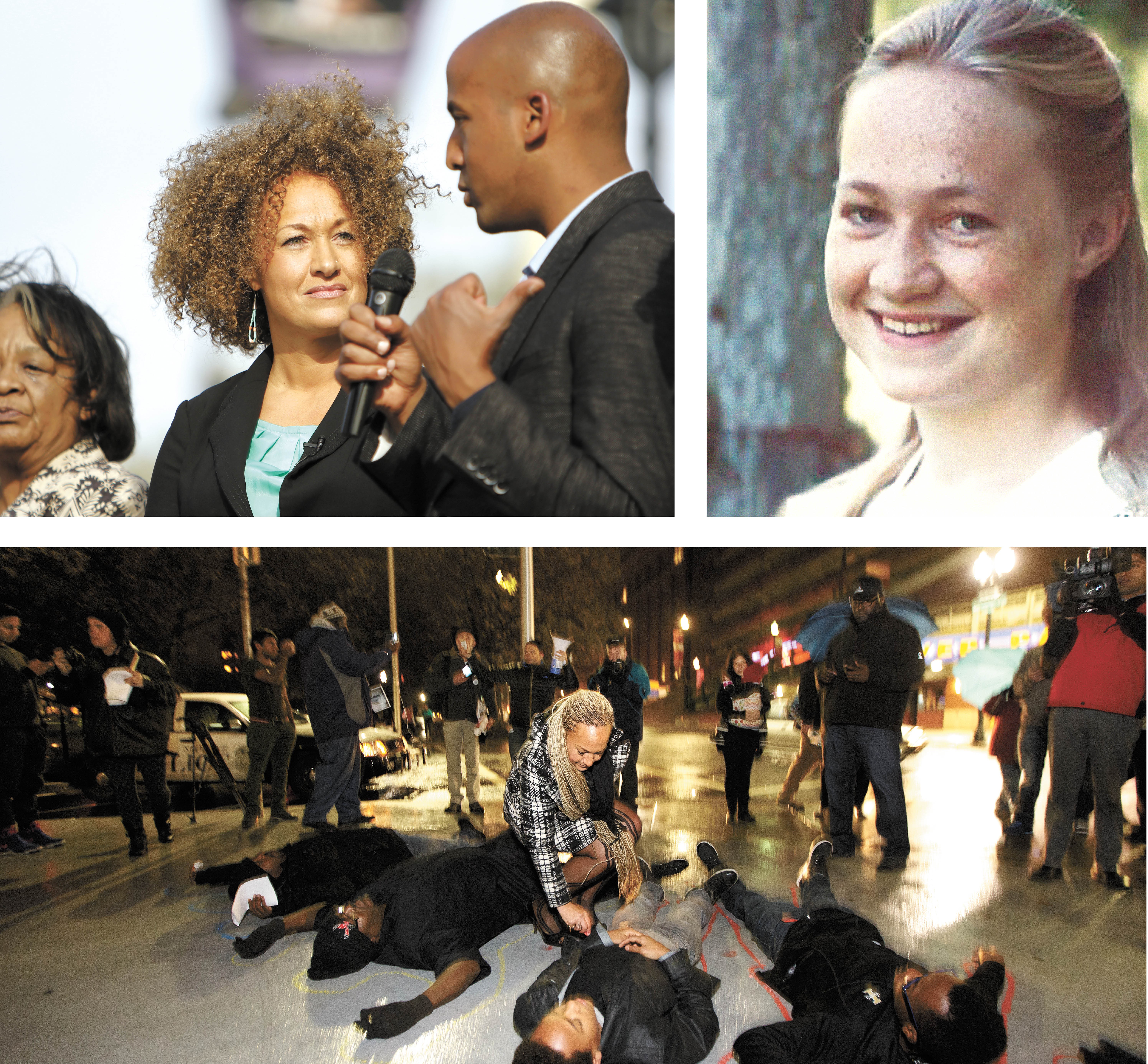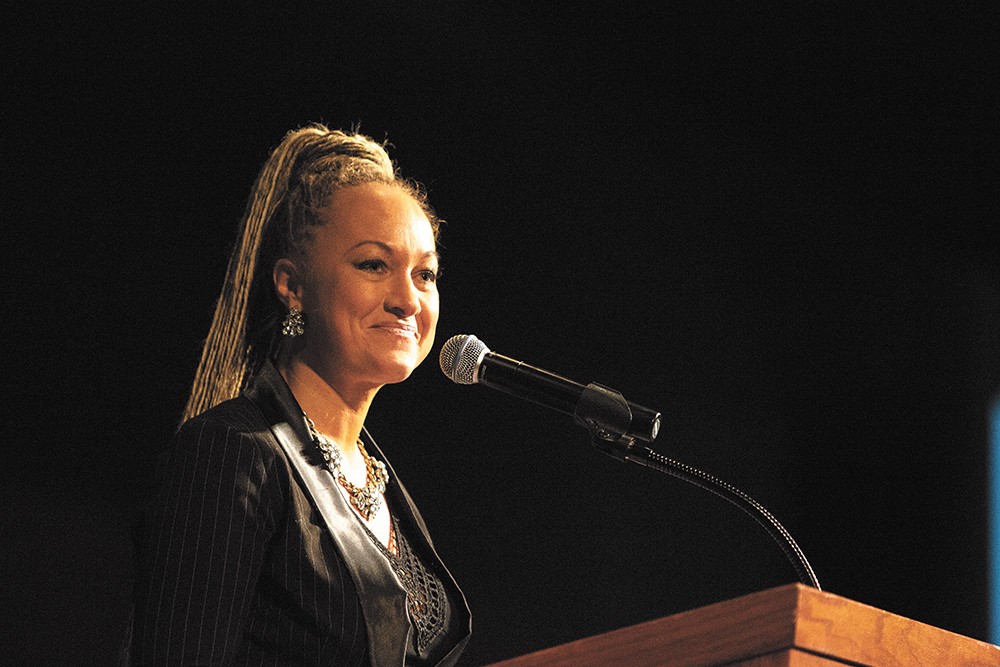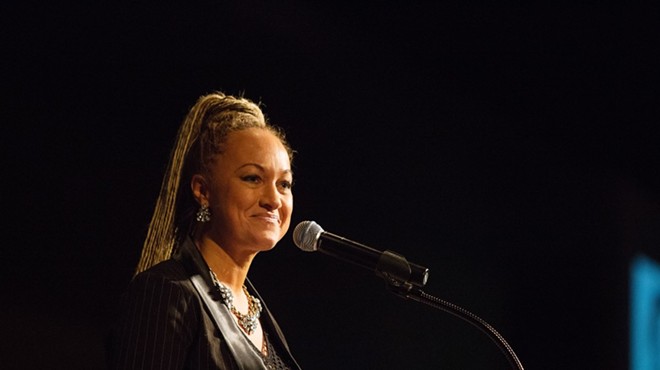Rachel Dolezal didn't become a leading voice on racial issues in the Inland Northwest by accident.
She fought for it. She faced off against two competitors to become chair of the Spokane police ombudsman commission. She defeated a black incumbent named James Wilburn Jr. to become president of the NAACP's Spokane chapter, "calling for a strong arm of the NAACP in Spokane to carry on civil rights." She had her own licensed diversity-training business. At times, she's wanted even more: When she worked for the Human Rights Education Institute in Coeur d'Alene in 2010, Dolezal threatened to leave if they didn't make her executive director. When they didn't, she quit, accusing the anti-discrimination institute of discrimination.
So it's possible that had Dolezal sought a smaller profile, all this wouldn't have happened. The local media wouldn't have found out that Spokane's most prominent black commentator is... actually white.
In less than a week, Dolezal went from a respected local leader to the top trending topic on Twitter, to an international joke and outrage, to the uniquely modern archetype — an instant celebrity, occupying the intersection of fame, infamy and morbid fascination.
By Monday, she'd been fired as an Inlander freelancer, was under an ethics investigation for her role on the ombudsman commission and had resigned from the NAACP. And as the Spokane community has been left reeling, Dolezal herself hasn't apologized — instead, she's been on a media blitz in New York, speaking to Matt Lauer and MSNBC's Melissa Harris-Perry. And that's just the beginning of Dolezal's planned journey.
"Challenging the construct of race is at the core of evolving human consciousness," she said in her letter resigning from the NAACP. "This is not me quitting; this is a continuum."

Empty threats?
It wasn't just Dolezal's position that made her famous. It was the string of alleged hate crimes against her that had led newscasts and been splashed across newspaper front pages for five years. They were literally a part of her résumé — the words "eight documented hate crimes" against her was posted directly on her bio at Eastern Washington University.
In March, Blaine Stum, chair of the Spokane Human Rights Commission, put out a press release stating that, after receiving a threatening letter, Dolezal had been hit with her "ninth hate crime in less than a decade." That's what Dolezal told him. He put together a rally for her, with more than 200 people marching against hate, chanting slogans like, "This is what supporting Rachel looks like."
But on Monday, Stum was pacing before TV cameras, waving his notes in the air. "We do not believe you can build a just community on lies!" Stum proclaimed. "The reality is that she lied to most of us in this crowd!"
Not only do police records show far fewer than eight suspected hate crimes, Dolezal's reports are filled with red flags. A swastika appeared on the door of the Human Rights Education Institute in 2010, but the Institute's surveillance system, oddly, wasn't working. (Dolezal told the Coeur d'Alene Press it may have been a power surge.) When Dolezal claimed to have found a noose on her property in North Idaho, a neighbor told police that he was 90 percent sure the rope — hanging from his shed — was his. He had used it to hang deer, and he said he told Dolezal that after she reported it. (She denies this.) When the cops called Dolezal to follow up, she never called back, records state.
She's portrayed home burglaries with no apparent racial component as hate crimes against her. Yes, the N-word had once been written in chalk with an arrow pointing to Dolezal's boyfriend's house — but that was months before she'd moved in. She said she was a victim of a home invasion that scared her son half to death — possibly by a violent motorcycle gang. But her son told cops that not only was he not scared, the couple who wandered into their house through an unlocked door had simply seemed confused.
"They looked like normal, middle-class white people," he told police. The "home invaders" even took time to try to retrieve Dolezal's escaped cat from a neighbor's yard, her son said.
Most mysterious, however, was a package ostensibly sent to her from someone calling himself "War Pig. ret." There were no direct threats to Dolezal, but an Inlander story on her was in the package, along with a mix of racially charged pictures and strange rants against things pertaining to California, including a refinery in Richmond and pay raises for Contra Costa County deputies. The police investigation found the letter didn't have a postal mark — meaning it was likely put in the P.O. box by someone who had a key to it. (Detectives cleared postal workers in their investigation.)
And when Dolezal got a follow-up letter, she told media and Stum that it was yet another death threat. In truth, it was the opposite: It was "War Pig," writing from Oakland, apologizing to Dolezal for "causing her worry, concerns, and grief."
"Every single one of them that she received, she represented as a clear threat to her and to her organization," Stum says. "The best thing we can do is to call it as what it is. And that is a lie."
Boiling points
Suspicions regarding Rachel Dolezal had simmered for years. But they came to a boil in an instant.
Anonymous commentators on the Spokesman-Review, Boise Weekly and Coeur d'Alene Press websites had been sounding the alarm as long as five years ago that Dolezal was a "bona fide white woman" and that "people who have known Rachel for years do not like seeing her fraudulently passing herself off as 'black' for the sake of 'the cause.'" The comments were usually surrounded by blatant racism, making them easy to dismiss as lunacy.
But her hate crime claims sent the local media digging deeper. Last week, at least four Spokane media outlets — the Coeur d'Alene Press, the Spokesman-Review, KXLY and the Inlander — were separately digging into Dolezal before the story broke. (In the case of the Inlander, reporters requested police records related to all Spokane police reports involving Dolezal on March 5, and again on June 2.)
Spokesman columnist Shawn Vestal says rumblings of a private investigator digging into Dolezal sped up his own reporting. "It made me take the identity question seriously," Vestal says.
KXLY's Melissa Luck says she got wind of the oncoming Coeur d'Alene Press story and preempted it with a story on Dolezal's suspicious hate crime claims.
But it was the Coeur d'Alene Press that had the bombshell exposé: They had the interview with her estranged biological parents, both white. They had her birth certificate. And they had her childhood photos: Dolezal's freckled skin was pale as snow. Her eyes were blue. Her hair was blonde. There wasn't any doubt: She looked white.
And no, her dad wasn't black former Marine Corps veteran Albert Wilkerson Jr., as she told City Councilman Jon Snyder, Idaho Rep. Paulette Jordan and countless others. No, Izaiah Dolezal wasn't her son — he was her adopted brother. No, Jesus Christ wasn't listed as the witness on her birth certificate, as she'd told a reporter for EWU's paper, the Easterner. And no, her real parents said, she wasn't born in a teepee or used a bow and arrow to hunt her own food, and was never beaten with "baboon whips."
The story her parents told to countless outlets was a complicated one: They'd adopted four black children. Dolezal had received her master's degree from historically black Howard University — but only began changing her appearance to appear black around 2006 and 2007. One of her adopted brothers later claimed Dolezal had told him to keep quiet, for fear of blowing her cover.
"You know, when they're using a false premise to achieve greatness and power, I think it's our job as watchdogs to point that out," Coeur d'Alene Press reporter Jeff Selle said in an interview with KXLY.
Others in the media, however, have paused, reflecting on whether they could have done better. In Vestal's case, there's a March 3 front-page feature he wrote titled "NAACP leader confronts hate with confidence," next to a picture of Dolezal holding a .44 caliber revolver.
"I feel responsible for having perpetrated some of this stuff without skepticism," Vestal says. "I spent all day Friday writing a piece that I killed. I can't get my headspace straight on this story."
Feeding frenzies
The ingredients for a social media firestorm were all there: It was instant fodder for outrage, mockery and astonishment. It got at the explosive core of America's most controversial issues. Liberals latched onto it with outrage — here was the ultimate form of racial appropriation. Conservatives cackled with glee: If you could redefine your gender with just a word, why not your race?
And so came thousands of "Orange is the New Black" jokes and Caitlyn Jenner photoshops and memes with Robert Downey Jr.'s blackface character from Tropic Thunder. A picture of the Scooby Doo gang pulling off a Dolezal mask to reveal a white girl underneath blasted across the Internet. Twitter users mistook satirical accounts for genuine reactions and shared photoshopped pictures as if they were real. Those uneasy with the Internet mob, and those worried that more important stories were being drowned out, were ultimately overwhelmed by the Internet mob.
"This #RachelDolezal mess ain't nothing new to us Native Americans," locally born author Sherman Alexie quipped. "There are tons of fake Indians out there. Some of them are famous."
Jon Stewart led the Daily Show with the story on Monday: "Whaaaat? That's crazy. There's an NAACP chapter in Spokane?" A half-hour later, Larry Wilmore quipped on the Nightly Show that KXLY should have asked Dolezal: "A boat is leaving from Africa — were your ancestors below deck or above deck?"
Bloomberg columnist Dave Weigel, meanwhile, called her a "bizarre scammer" but also "manna from heaven for thinkpiece writers."
Indeed, the thinkpieces rained down from outlets like Buzzfeed, Jezebel, Slate and The New Yorker. It was a brutal reversal: Dolezal had once regularly opined on why certain actions were racially "problematic," and now she was the one being hammered internationally with same sort of critique.
Soon, national reporters began to turn up darker corners with uglier stories. The conflict between Dolezal and her family had been brewing for years, and it was getting worse. Dolezal's biological brother Joshua, an Iowa English professor, had been accused of sexual assault. His trial begins in August, and suddenly it had been thrust into the national spotlight.
The richest irony came from the Smoking Gun website: They revealed that Dolezal had unsuccessfully tried to sue Howard University for discrimination when she didn't get a job she felt she was owed.
But back then, it was because she was a pregnant white woman.
Integrity vs. celebrity
Plenty of people across the world were angry at Dolezal, despite never having met her. But many of the people who had trusted her were feeling something different. Della Montgomery-Riggins had marched beside Dolezal in the anti-hate-crime rally.
"I'm a light-skinned African American woman. And I've had real experiences. I've had part of my past I'd love to lie away. So is that acceptable?" Montgomery-Riggins says. "I feel betrayed. I feel ultimately betrayed."
Before Dolezal resigned, NAACP member Kitara Johnson gathered signatures for a petition, "It's not about race, It's about integrity!" to get Dolezal to take a leave of absence. Johnson and a small crowd of about two dozen others showed up outside the NAACP office on Monday. Before a line of TV cameras, they held signs and chanted "Integrity Matters!"
Dolezal herself was nowhere to be seen: She was on a plane, flying first class to New York.
Dolezal hasn't returned phone calls, emails or Facebook chat messages from the Inlander. She told KREM, "It's more important to clarify [her race] with the black community and with my executive board, than it really is to explain it to a community that, quite frankly, I don't think really understands the definitions of race and ethnicity."
But it wasn't the black community that she answered questions from first. It was the Today show's lily-white Matt Lauer.
"You've had a busy week," Lauer began. "You've started a discussion on race and what it means in this country."
And Dolezal — still with darker skin and black hair — gave a warm smile. "I identify as black," she said, drawing from the language of gender identity. Her identity started at 5, she said, telling Lauer that she was drawing self-portraits of her very pale self with a brown crayon. (Her parents deny this.) She brushed off claims that she's intentionally darkened her complexion, saying, "I certainly don't stay out of the sun."
Lauer didn't question the hate crimes. He still referred to Dolezal's adopted brother as one of her sons. And Dolezal objected to characterizations that she deceived anyone. She said she just didn't correct local media outlets' characterizations of her race.
In response, Lauer didn't point to her Inlander column from March where she repeatedly uses "we" and "our" to refer to black women, nor the ombudsman commission application where she explicitly marks "Black/African-American" as part of her "Ethnic Origin," nor the KREM interview a few days earlier where she said, "Yes, I do consider myself to be black."
Dolezal apologizes for nothing. And she notes that — although the conversation has been ugly at times — "the discussion is really about what it means to be human." And then her 10 minutes were up, and the Today show moved on to talk about hurricanes and why your dog might ignore people who are mean to you.
No word yet on what fame may yield for Dolezal, though Variety declares: "Let there be no doubt that the Rachel Dolezal story will be told by Hollywood."
Lost voices
The night before Dolezal's interview, NAACP members gathered behind the Saranac Public House to have their own discussion on what it means to be human.
The local NAACP meeting Monday night had been canceled, apparently by orders, without explanation, from the national and regional NAACP. But a crowd of 20 members came anyway. Sandra Williams, of the Washington State Commission on African American Affairs, anticipated it.
"Before you can get to solutions, you need to let people express what they're feeling," Williams says. "And there has not been an opportunity."
So she led the crowd to the patio behind the Saranac to do just that. Amid the chaos, Williams worries that "the voices of the people that are in the room are being lost."
As the sun set, they sat on metal chairs and retaining-wall bricks, without international news cameras or satellite uplink trucks, and they talked and listened. They argued and yelled and asked for calm. Some were angry or defensive or felt depressed or betrayed. Some speakers veered off on long tangents, plumbing the history of Spokane civil rights setbacks or debating the history of blackface. They complained about their frustrations with the media, with politicians, with local, age-old NAACP wounds.
And yes, they talked about Dolezal. Bob Lloyd, a longtime NAACP figure, praised the way she reorganized the local NAACP chapter, lighting a fire under an organization that had long seemed complacent. For years, the NAACP struggled to bring college students to attend its meetings, but Dolezal brought them from North Idaho College, Whitworth and Eastern Washington University. Members of white progressive groups started coming, too. While some black ministers stopped attending NAACP meetings when Dolezal became president, Lloyd says Dolezal responded deftly.
"She began to organize NAACP ministers to visit their churches on Sunday," Lloyd says. "That's a good thing!"
But there was another side. Set aside her hate crime claims and her skin color: Dolezal's brash leadership style resulted in serious controversy wherever she went. That was true on the ombudsman commission, where Dolezal was among the targets of a recent 101-page whistleblower complaint from another commission member. And it was true at the NAACP: Describing her as insulting and insincere, Tia Griffin says she warned NAACP leadership about Dolezal's style. "It was just cold," she says. "I said she didn't care about the community." She sees the scandal as vindication for her intuition.
At the end of the night, everyone seemed to take a deep breath. Williams got the sense that, despite the still-raw feelings, rebuilding had begun. "People on polar-opposite ends ended up walking out together," she says. ♦
































